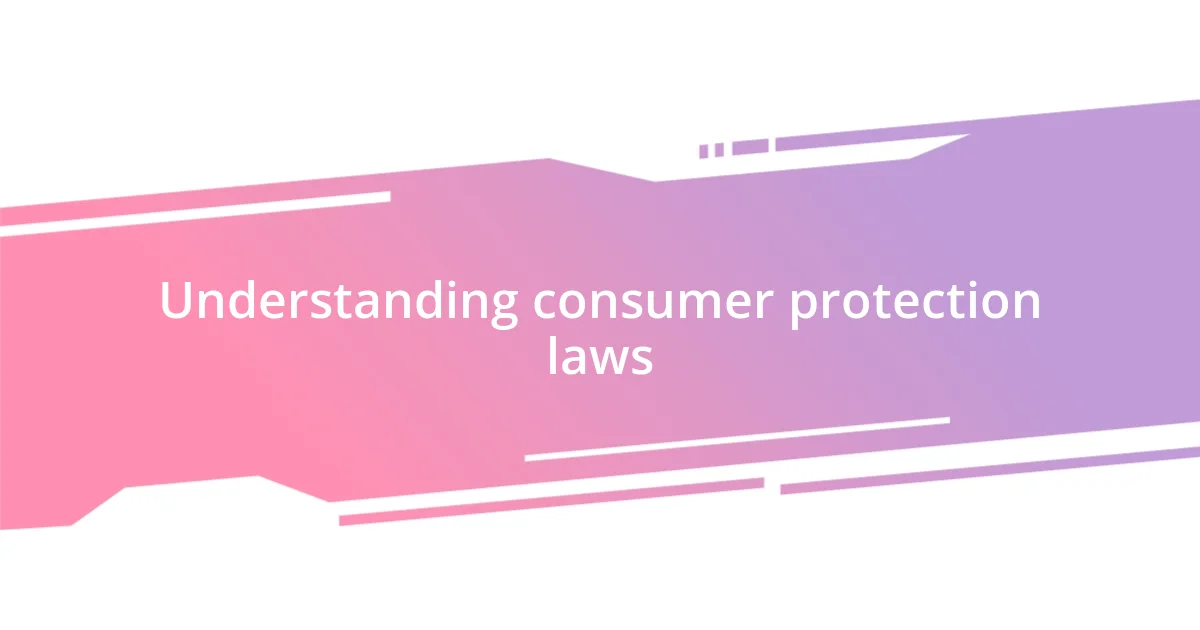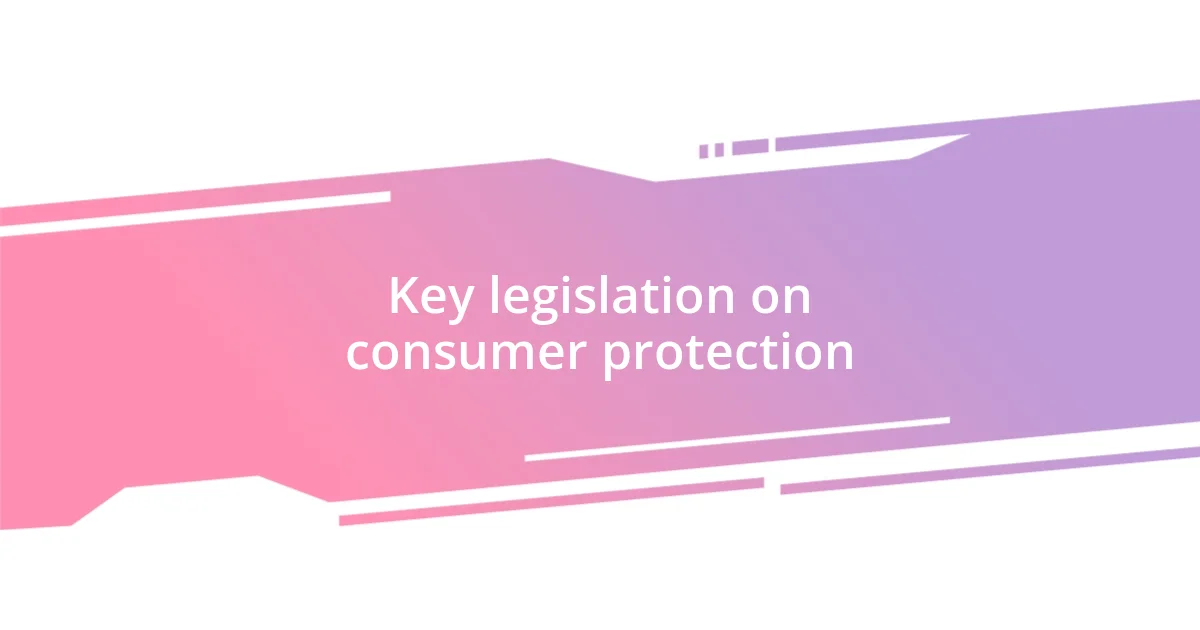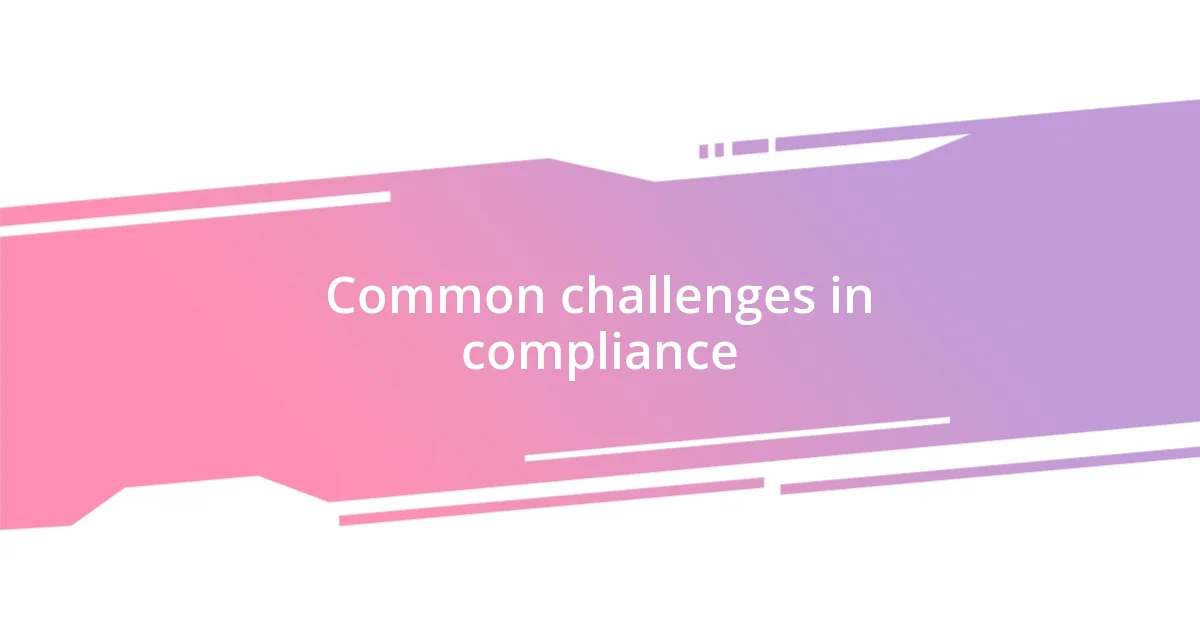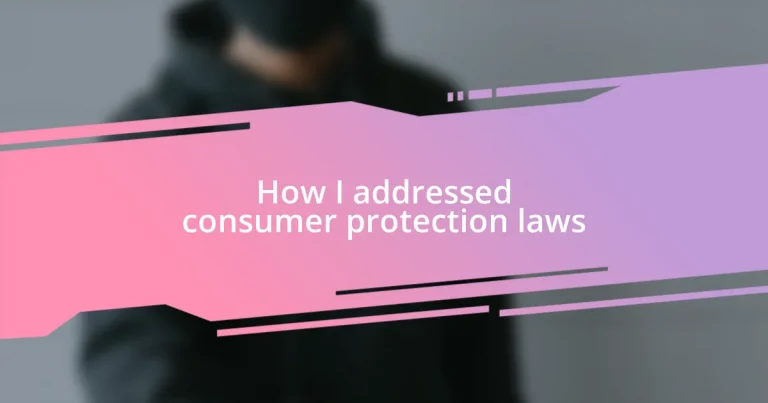Key takeaways:
- Consumer protection laws safeguard against unfair practices, empower consumers, and promote awareness of rights.
- Key legislation, such as the FTC Act and Consumer Product Safety Act, ensures market integrity and product safety.
- Best practices for businesses include clear communication, accessible feedback mechanisms, and ongoing consumer education to build trust and compliance.

Understanding consumer protection laws
Understanding consumer protection laws is essential because they serve as a safeguard against unfair business practices. I remember a time when I felt uneasy about a purchase—was it really worth the price, or was I being misled? It’s this uncertainty that these laws are designed to eliminate, ensuring that consumers are treated fairly and informed about their rights.
These laws cover a broad spectrum, including product safety, truthful advertising, and privacy protection. It really struck me when I learned about the importance of transparent labeling; consumers should be able to trust what they read. Have you ever bought something based on a misleading label? I know I have, and it left me feeling frustrated and duped.
On a deeper level, understanding consumer protection laws can empower you to advocate for yourself and others. I’ve often found myself in conversations with friends about their rights as consumers, and it’s amazing how many people aren’t aware of what they can do if they feel wronged. Isn’t it empowering to know that there are systems in place to hold businesses accountable?

Importance of consumer rights
Consumer rights play a crucial role in our daily lives, often acting as a safety net when we make purchases. I recall a time when I purchased a product that didn’t live up to its promises. The frustration was palpable, but knowing that consumer laws existed gave me the confidence to seek a resolution. It’s essential that consumers understand these rights to ensure they’re treated equitably and can navigate issues when they arise.
Here are some key reasons why consumer rights matter:
- Fair Treatment: Ensures that businesses cannot exploit consumers through deceptive practices.
- Safety Assurance: Protects consumers from harmful products, fostering a safer marketplace.
- Empowerment: Gives consumers the knowledge and tools to assert their rights and seek redress when necessary.
- Trust Building: Encourages transparency, allowing consumers to confidently engage with businesses.
- Accountability: Holds companies responsible for their actions, leading to better practices overall.
In my own experiences, I’ve seen how understanding consumer rights fosters a sense of community. When we share stories of triumph or setback, we create a ripple effect that encourages others to stand up for their rights. It’s a powerful reminder that we’re all in this together.

Key legislation on consumer protection
Key pieces of legislation play a fundamental role in shaping consumer protection laws. For instance, the Federal Trade Commission Act prohibits unfair or deceptive acts in commerce, which I find crucial for maintaining market integrity. When I think about my own experiences dealing with misleading advertisements, it’s clear to me how important this legislation is in safeguarding consumers from manipulation.
Another significant law is the Consumer Product Safety Act, which mandates the safety of consumer products. I remember purchasing a toy for my child, only to discover later that it had been recalled due to safety concerns. Legislation like this not only helps protect consumers like me but also holds manufacturers accountable for the safety of their products.
Furthermore, the Fair Credit Reporting Act ensures consumers’ rights regarding their credit information. I once faced challenges with my credit report, and understanding this law helped me navigate the process of disputing inaccuracies. This law really illustrates how consumer protection laws serve as a powerful tool that empowers individuals in financial matters, making it essential for everyone to be aware of their rights.
| Legislation | Key Focus |
|---|---|
| Federal Trade Commission Act | Prevents deceptive business practices |
| Consumer Product Safety Act | Ensures safety of consumer products |
| Fair Credit Reporting Act | Protects credit information |

Steps to comply with laws
To comply with consumer protection laws, the first step is to conduct a thorough audit of your business practices. I personally remember sifting through contracts and terms of service to ensure they were clear and fair. It can be a tedious process, but it’s vital to identify any misleading or ambiguous language that could misguide consumers.
Next, implementing comprehensive training for staff is crucial. I once attended a workshop where the focus was on consumer rights and the importance of transparency. It opened my eyes to how every employee plays a role in fostering a compliant environment. By ensuring that your team understands the laws, you create a culture of accountability that extends to how customers are treated.
Finally, regularly reviewing and updating your policies based on current regulations cannot be overstated. In my experience, staying proactive rather than reactive is the key. How often have we seen businesses struggle because they failed to adapt to changing laws? By actively seeking out updates and adjusting accordingly, you not only protect your business but also demonstrate a commitment to consumer rights that resonates with your customers.

Best practices for businesses
When it comes to best practices for businesses, clear communication is paramount. I vividly recall a time when I was confused by small print in a contract. Seeing that wall of text made me hesitant to make a purchase. By ensuring that your terms and conditions are straightforward, you not only build trust but also empower consumers to make informed decisions. Isn’t that what every business wants?
Another effective strategy is to create an accessible feedback loop. I once had a product malfunction, and the prompt responses from customer service made a world of difference. Companies that actively encourage feedback show that they value consumer opinions and are willing to make changes based on those insights. Think about it—doesn’t a responsive business feel more trustworthy?
Lastly, consider the benefits of promoting consumer education. I remember attending a seminar that detailed my rights as a consumer—it opened my eyes! Providing resources such as guides or FAQs can help clarify complex regulations and build a well-informed customer base. Educated consumers are better advocates for their rights, creating a healthier marketplace for everyone. Have you thought about how an informed customer can enrich your business experience?

Common challenges in compliance
I’ve encountered several common challenges in compliance with consumer protection laws that many businesses face. One particularly difficult aspect is keeping up with the constantly changing regulations. I remember a time when a significant update was announced, and I scrambled to revise our policies. It felt overwhelming, as every tweak had implications for the entire organization. Have you ever found yourself adjusting to new rules that seem to pop up out of nowhere?
Another challenge lies in ensuring that all employees fully grasp the importance of these laws. I once worked with a colleague who viewed compliance as just another box to check. However, after attending a team meeting, the shift in perspective was remarkable. When individuals understand the “why” behind the regulations, their engagement and diligence improve significantly. Isn’t it crucial for everyone in the organization to feel a sense of responsibility towards compliance?
Lastly, managing consumer expectations can become a tricky balancing act. I recall an instance where a customer was unhappy with a policy change, despite it aligning with legal guidelines. Navigating that conversation was a challenge, as it required me to emphasize transparency while also protecting the business’s interests. How can we ensure that consumers feel heard while still adhering to the law? It’s this kind of balancing act that many businesses struggle with continuously.

Resources for ongoing education
When it comes to resources for ongoing education, I find that industry webinars are incredibly beneficial. I once attended a session hosted by a consumer protection agency that not only clarified complex legal jargon but also provided real-world case studies. The insights I gained there transformed my approach to compliance—have you tried participating in such interactive sessions? They truly bridge the gap between theory and practice.
Another great resource I’ve come across is online courses tailored to consumer protection laws. I enrolled in a self-paced course that delved deep into consumer rights and regulations. The flexibility of studying at my own pace made it much easier to fit into my busy schedule. Plus, the certificate I earned added credibility to my professional profile. Have you considered how investing in your education can enhance your skills and knowledge in this field?
Don’t overlook the value of networking with other professionals in the industry. I recall a recent conference where I exchanged ideas with other business owners struggling with similar challenges. That sense of community was reassuring—I realized I wasn’t alone in navigating these laws. Engaging with peers not only provides support but also exposes you to diverse strategies and solutions. Have you thought about how collaboration can lead to better consumer protection practices?














